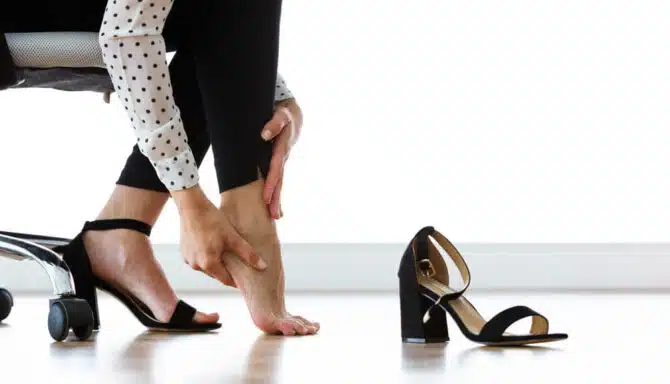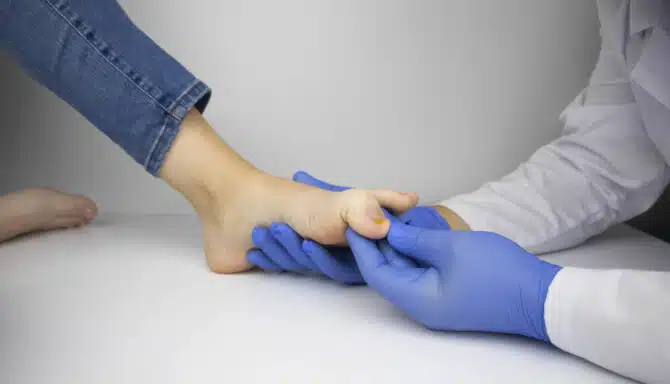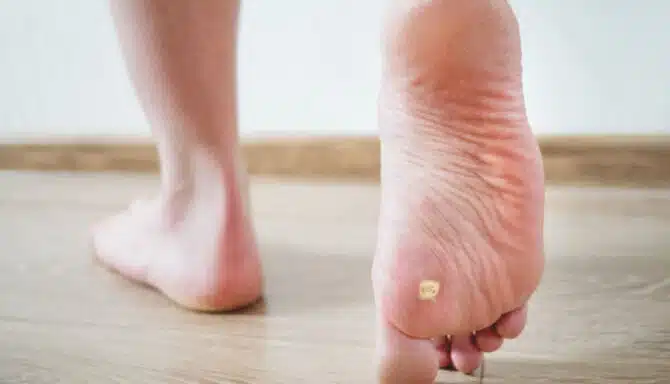There are plenty of myths about foot odor. From thinking it only happens in hot weather to assuming those who struggle with it must not bathe or shower, it’s a foot condition that can be difficult to understand and affect our confidence. You may also wonder if foot odor is a serious problem and when to see a foot specialist, like a podiatrist or chiropodist, about it. On the other hand, you may be able to tackle it on your own. Today we’ll talk in depth about when you might need some extra help with your foot odor.
What is Foot Odor?
Foot odor is the unpleasant smell that arises from the feet. The main cause of foot odor is the excessive perspiration of the feet combining with bacteria, often occurring in areas where sweat accumulates the most, such as inside shoes or socks. This creates an ideal environment for bacteria to thrive.
Fun fact: human sweat itself is almost entirely odorless! Odors arise when it interacts with bacteria present on the skin, particularly on the soles and between the toes, forming odorous substances. This breakdown process produces an array of compounds, including acids, ammonia, and sulfur-based compounds, which are responsible for the characteristic smell.
Persistent Foot Odor Causes and How to Prevent Foot Odor
One condition that exacerbates foot odor is plantar hyperhidrosis, a condition where the sweat glands on the soles of the feet produce excessive amounts of sweat. When the feet sweat excessively, the increased moisture fosters a more conducive environment for the growth of bacteria, contributing to stronger foot odor.
This is a medical condition that often requires intervention to manage the excess sweating. Treatment options include topical antiperspirants, double layered cotton socks and Anticholinergic creams. A podiatrist or a chiropodist can also recommend absorbent insoles and give you advice on how to practice proper foot hygiene, which should include washing with an antibacterial soap, thoroughly drying, and applying foot powder or antifungal powder.
In addition to plantar hyperhidrosis, several other factors and health issues can contribute to foot odor:
Fungal Infections
Fungal infections, such as athlete’s foot, thrive in warm, damp environments, which is why sweaty feet are more prone to infection. These infections can cause itching, burning, and peeling skin, alongside a musty odor due to the fungus feeding on skin cells.
Diabetes
Foot odor can be a serious concern for individuals with diabetes, as it might signal an infected wound or a diabetic ulcer, particularly in the toes or feet. Due to reduced circulation and nerve damage associated with diabetes, wounds can go unnoticed, and the risk of infection increases. The presence of odor may indicate that an infection is developing, which requires prompt medical attention to prevent complications such as cellulitis or gangrene.
Poor Circulation
Poor circulation can lead to excessive sweating as the body tries to regulate temperature. However, insufficient blood flow also prevents the proper removal of toxins, causing a build-up of bacteria that contributes to foot odor. It’s important to try and improve your circulation as much as possible: one way you can do so is with exercises that help with circulation in the winter time.
Hormonal Imbalances
Conditions such as pregnancy, menopause, or thyroid disorders can cause hormonal changes that influence sweat production. These fluctuations in hormones can trigger excessive sweating, creating an environment that supports bacterial growth and results in stronger foot odor.
Lifestyle and Diet
Poor foot hygiene or wearing shoes that do not allow the feet to breathe can trap moisture and heat, promoting bacterial growth that causes odor.
It’s important to wear breathable shoes to ensure excess moisture doesn’t build up and disrupt a healthy shoe environment. Moisture wicking socks are another great way to be vigilant against foot odor, in addition to regularly changing your socks throughout the day and keeping your feet nice and clean, which we discussed earlier.
Diets high in spicy foods, alcohol, or caffeine can also increase sweating and contribute to foot odor.
Is My Foot Odor A Serious Problem?
In general, foot odor is harmless and can be managed with good hygiene. But it can become a serious issue when it signals an underlying health problem, especially if it’s persistent, worsens over time, or has a particularly foul smell that differs from the typical cheesy, vinegary or sweaty smells we all recognize in foot odor.
When combined with other symptoms such as redness, swelling, pain, or itching, it could indicate an infection like athlete’s foot or cellulitis. If the odor is accompanied by open sores, blisters, peeling skin, or wounds that don’t heal, it’s important to pay attention to these signs as they may point to infections or worsening diabetic neuropathy that requires a prompt visit with a chiropodist or podiatrist. This is also crucial if your foot odour is accompanied by other concerning symptoms, such as a change in skin colour. Typically, it will be obvious if a pungent smell is radiating from a wound instead of just your feet, so in this case, treat the odor as an urgent matter.
When To See A Foot Specialist For Foot Odor
If you’re unsure whether your foot odor is linked to a more severe issue, it’s a good idea to consult a healthcare professional for a thorough evaluation, and see a chiropodist at a foot clinic.
These experts can help identify the root cause of persistent odor, whether it’s fungal, bacterial, or linked to a medical condition like diabetes or plantar hyperhidrosis. They can also recommend effective options tailored to your specific needs, such as prescription topical solutions, high-quality creams and powders, advice on managing excess sweat, footwear recommendations, and more. Foot specialists are trained to spot subtle signs that might go unnoticed and can offer targeted solutions and tailored treatment plans that go beyond home remedies.
Seeing a foot specialist can also help you better manage foot odor linked to chronic conditions. For example, if you have diabetes or poor circulation, a chiropodist can advise you on preventative measures to avoid complications like infection or wound degradation. If you’re experiencing frequent or severe foot odor, don’t wait for it to escalate—getting professional help early can ensure that any underlying issues are addressed promptly and effectively.










